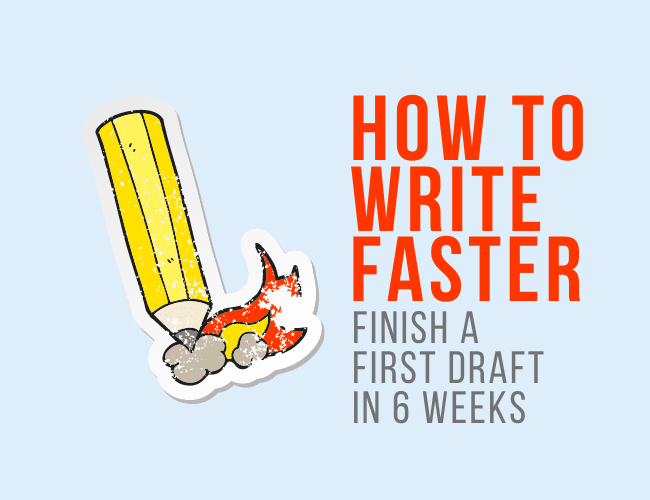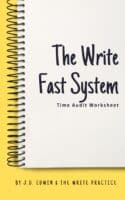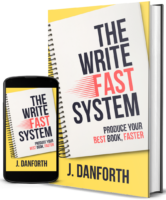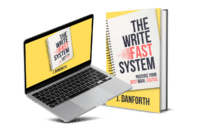Do you have an abandoned or partial manuscript sitting in a drawer or on your hard drive, one you just couldn't finish, even after maybe years of chipping away at it? Me too. Until I learned how to write faster. The Write Fast System not only boosted my writing productivity, but it has helped me finish numerous projects in record time.

Writing the first draft for any book is hard work, but it is also manageable. The amount of time it takes does not have to be daunting at all.
In fact, it's even possible to learn how to write faster and complete your book in less time – six weeks, even!
That's my goal for my upcoming blog series, to teach you what I've learned about writing faster, and not only that, but show you why improving your writing speed will make you a better writer as well.
How I Learned to Write Faster First Drafts
When you sit down in front of that endless blank page and think about your writing project, does it look utterly, incredibly vast, like a white desert waiting to be filled? Do you feel yourself wanting to stop before you even start, putting your book off for yet another day, because the idea of putting that many words on paper just feels too daunting? Do you find yourself going down that rabbit hole of “I'll never be able to do this”?
Maybe you are telling yourself, “One day I will start, that day will definitely come.” Doing this give yourself a little vote of confidence, even though you have no idea when that day will actually happen.
Maybe you get distracted by something shiny on social media, and promise yourself the writing will come the next day, when you “feel it”.
Maybe the “time of day” just feels wrong for writing. After all, it's morning and you work better as a night owl.
But sooner or later, you realize that these are just excuses.
My first book took me three years, and that’s just the time it took to write one draft. Altogether, if you count the time from the inception of the idea and the bits and pieces of poorly conducted planning, it took at least six.
I dreamed of the idea for at least two years, wrote bits and pieces, put it aside, changed my mind on and off, forgot where the story was going in between months of inaction, made notes, lost notes, renamed the characters, redesigned the plot, made the story too short, then too long, and everything in between. I even paid for several fancy book-writing tools. Mostly, I was wasting time.
By the end, I ended up with a 150K word behemoth and was so tired of looking at it that I couldn’t bring myself to write another draft.
What I learned in this experience, above all else, is how not to write a book.
Fast forward a few years, and I wrote my second book.
The first draft of this book, 90K words long, took a little less than six weeks. I used Google docs for the whole thing, editing and formatting and all.
Not only that, it was a far more cohesive, well-plotted book with a tighter story and more well-developed characters. This book, titled Headspace, has become the first in a series and will be published this summer by Story Cartel Press.
So what changed in those years?
How did I go from a multi-year slog to turning out books that are not only fast and efficient, but also of far improved quality compared to that first disaster?
In a very special series of articles, I’m going to take you through the lessons, tips, and tricks in efficiency that I’ve learned over the past ten years so you can learn how to write faster.
These lessons have helped me improve my writing productivity greatly, even in a year like 2020. I hope that by sharing them with you, you will be able to write your best stories—specifically your first drafts, quickly and efficiently, without having to take a decade to figure it out.
Because, surprise of all surprises, productivity can be learned!
How to Write Fast: The 3 Fast Writing Essentials
Learning anything takes time and that should come as no shock to anyone. However, the good news about productivty is that you can learn it while simultaenous accomplishing your goals and projects.
In this blog series, we will go into detail about how this process works, but there are three core things you need in order to write fast:
- The correct mindset
- A set of writing techniques
- A good system.
Master these three and you will write faster, and finish your stories, too.
Develop a (Fast) Writing Mindset
Believe it or not, productivity begins with a mindset. This applies not only to your writing schedules and habits, but also how you view the first draft of your story.
The first draft is different from all the subsequent drafts. It is the starting point of everything. It serves as the skeleton of your story that holds up the flesh of the story.
In a drawing, it would be that first messy sketch under the final drawing that no one sees.
It is important to remember that the first draft does not have to be perfect. In fact, it doesn’t have to look anything like the final product. Remember that a first draft is a rough draft. It can be ugly, flawed, and full of typos, but all it needs is to be written. The first draft is not the time to be a perfectionist. Accepting this will often help you conquer that first writer's block.
Rather than trying to write a perfect first draft, it’s far more productive to focus on producing a first draft that does its best to support future drafts.
This lesson was one of the most important ones I’ve learned on my journey.
 And if you're thinking you don't have time? Abandon that limiting mindset now. Snag a copy of our free time audit worksheet. This simple 3-page worksheet guides you through the process of becoming less busy and finding more time for your writing. It's a great first step to prioritizing your writing dreams.
And if you're thinking you don't have time? Abandon that limiting mindset now. Snag a copy of our free time audit worksheet. This simple 3-page worksheet guides you through the process of becoming less busy and finding more time for your writing. It's a great first step to prioritizing your writing dreams. Apply Writing Techniques
More than that, writing can be learned.
The more you learn about the craft, technique, and act of writing, the more productively you will be able to write. This is the same principle as anything—you can build a house, paint a painting, or perform a dance choreography better when you are more familiar with the skills and craft involved.
But with endless resources, programs, seminars, and classes, how do you know where to start?
What’s going to be the most useful to you and what might turn out to be a waste of time? It’s easy to get overwhelmed or fall into the trap of feeling like you need an endless amount of education or even a university degree before you can write a decent book.
Good news—it’s a lot simpler than it looks.
With a targeting approach and a clear goal in mind, leveling up your writing skills – as well as your writing speed – doesn’t take nearly as much time as you might fear.
Use a System
What’s a system?
The word “system” can sometimes scare people off. It conjures images of computers and codes and complicated thingamajigs.
Many writers may not think systems have anything to do with their craft and shirk away from it. But it need not be that way—systems are your friends.
A system can be defined as “a set of principles or procedures according to which something is done; an organized framework or method.” To put it in simpler, clearer terms, it means a way to do things that is organized and repeatable.
When you have a system for how you approach a book, you will never be left lost and stranded, wondering what to do next.
You will always know the steps to take, from the first to the last. In this series, I will show you the system that’s worked for me as well as guide you on how to build better writing habits and continuously improve your own writing system.
Want the full Write Fast System? My new book just launched and with it, you can stop agonizing over a draft for years. With The Write Fast System, you can get that first draft down in as little as 6 weeks and develop a repeatable process for revision that will get your books in the hands of readers sooner than you've ever imagined.
 Want to finish your best book faster? Get our new book, The Write Fast System, today (on sale for a limited time)!
Want to finish your best book faster? Get our new book, The Write Fast System, today (on sale for a limited time)!Get The Write Fast System – $2.99 »
A Preview of My How to Write Faster Series
I’m beyond excited to take this journey with you all! Below is a list of all the topics that will be covered in this series. I hope to offer practical tips that can be implemented right away, for amateurs, professional writers, or otherwise.
What Should Be Included in Your First Draft?
In this first post we will get a better understanding of what you should accomplish in writing your first draft, including identifying important elements and goals, as well as what isn't quite a important in this process.
4 Key Reasons Planning a Novel Speeds Up Your Writing Process
This post helps you understand the importance of planning and the role it plays in writing a book quickly. The better your planning, the more you can save time on your writing. Writing fast isn't just about your typing speed, but how you approach the project as a whole.
This post is ready for you to study here.
How to Become a Successful Writer: 5 Productivity Tools
You will want to keep this post close by. It's going to serve as a helpful reference of what you need to achieve productive writing, and we'll use a variety of tools for your writer's toolkit to improve your writing flow.
Add these productivity tools to your writing toolkit today!
How to Write Good Fiction: 4 Foundational Skills and How to Build Them
Overwhelmed and don't know where to start building your skills? This is the post for you. This is where we will talk about how to identify your strengths and improve your weaknesses by learning some foundational skills that will enhance your productivity and keep you motivated and focused.
4 Practical Exercises to Improve Writing Skills (and Keep Practicing)
Practice is important. But blind, untargetted writing sessions can slow your progress. As Ernest Hemingway says—never mistake motion for action. We will talk in this post about the importance of the practicing mindset and how to make the most of it when trying to build your writing speed. We will also discuss free writing and how it may or may not work for you.
You can read more about the importance of practice (and how to practice writing) in this post.
Writing a Book Outline: 5 Essential Sections That Build a Solid Story
The very first steps of planning your book can determine if you finish your story and find the enthusiasm to start your next draft. In this post I will reference James Scott Bell's “build a bridge” method, plus a few tips of my own.
Start writing a book outline today; use this post as a guide.
Ending of Stories: How Planning an Ending Will Help You Write Faster
It may seem a little odd to talk about story endings when you haven’t even started writing. Deciding on the type of ending you want, however, is an important part of planning a book.
When a writer knows how their story ends, they can figure out important plot points in between, all the plot twists that eventually lead to that climatic moment.
In this article, writers can learn the essentials of a satisfying ending. You can read it here.
Scene Outline: How to Write Faster by Developing a List of Scenes
A scene outline, or scene list, can give your story plan focus and prevent burnout or confusion when actually writing your story.
Some people dislike the idea of planning scenes, but you would not believe how useful this exercise can be in helping build your story. Even better, you don't have to stick to it.
In this article, you'll learn how to create a scene list that gives your big story idea focus, which will help you not only write faster, but give you a higher chance of actually finishing your book. Read more about outlining a scene list here.
How to Revise a Novel: A Revision List to Edit With Confidence
My revision list is my best friend in writing draft one.
Not only does it serve as a central collection point for my notes, it also keeps me from having to revise as I write.
In this article, I share my revision list template with you as well as show you how to make it work for you. Used correctly, this tool will save you a lot of time during the editing phase.
Plotter vs. Pantser: When to Plot, When to Pants, and When to Combine Them
This series focuses heavily on planning. However, we are not all plotters.
Some of us are pantsers, but that doesn't mean some of these tips won't help you.
This article explores ways pantsers can make use of this series, and how planning in different ways can set writers up for success.
Writing Success: 3 Easy Steps to Develop Your Writing System
This article teaches writers what to do when it's time to actually write. After all the planning, all the ideas and thoughts and goals, this is where we put it all together into a system/writing process that you can use your first book and every book after it.
If you're ready to write but not sure how to start, learn about writing systems in this article.
Setting Writing Goals: How to Set Goals and Finish Your Book
The ultimate goal of this series is for you to not only start a book, but to finish it. But finishing the story is actually more than just a checkbox and in this post I will tell you why.
If you want to finish your story, you need to set writing goals that will push you to the end. This article can help you get organized.
Why Are Characters Important in a Story? 4 Ways Essential Characters Make Contributions
Part of efficient writing is knowing what's essentail and what's not. This applies not only to plot but characters as well.
In order for a secondary character—or any character—to matter in a story, they have to work as an essential character that impacts the protagonist, plot, setting, or another important aspect that shapes or moves a story forward.
This article teaches four ways that determine if (1) the character is essential, and (2) how they contribute to a story.
It also reviews the major types of characters and ways to determine if—for the characters who don't qualify as essential—you're better off revising their role, or cutting them from the plot.
Deadlines for Writers: 3 Easy Steps to Try as Your Deadline Looms
You're down to the wires. The deadline is coming up but you're not sure if you're going to be able to finish on time. This post teaches writers three tips and tricks that will help you wrap up your first draft fast.
It also shares how to set manageable deadlines that will ensure you finish instead of give up your manuscript.
Read more about deadlines for writers here.
What to Do After Writing a Book: The Do's and Don'ts
Here lies the real purpose of the first draft: it works as groundwork for the second.
After your finish a first draft, there's still a lot of work to do. This can overwhelm writers sometimes, and that's a completely normal feeling.
In this article, you can learn what to do with your completed first draft, how to take it into the second draft, and how to treat it for all its problems and shortcomings before you start your editing process.
Take a deep breath, there are strategies to help you do this!
Read more about what to do after writing a book here.
Write Faster, Write Better, and Most Importantly, Write!
I’ve been asked more than once when I started writing.
The truth is, I don’t remember a time in my life when I wasn’t writing. I dictated stories to my parents since before I could write myself. I stapled paper together and made my own books. I wrote for fun, wrote to relieve stress, wrote when I was happy, and wrote when I was sad. I've been a short story writer, fan fiction writer, blogger, novelist, and a few things in between.
I dealt with the unpredictability of the past year by writing two books, several short stories, and a number of articles. I’ve walked away from it every now and then, and sometimes I find myself procrastinating and putting it off, but at the end of day, I always find myself writing once more.
Writing lifts something in me that nothing else can. It’s joy, passion, and creation all rolled into one.
If this is true for you, too, I invite you to come join me for this series. We will take an in-depth look into exactly how to get the most out of your writing time, however limited it is, and get that book inside of you onto paper faster and more easily than ever before.
You will see that there is no trick to writers who churn out book after book, only basic skills, a simple system, and a solid mindset that anyone can obtain.
Until next time, I hope you’re warming up your engines to write. We’re in for a heck of a (fast) ride.
What writing techniques do you use to write faster? Let use know in the comments!
 Want to finish your best book faster? Get our new book, The Write Fast System, today (on sale for a limited time)!
Want to finish your best book faster? Get our new book, The Write Fast System, today (on sale for a limited time)!Get The Write Fast System – $2.99 »
PRACTICE
Over the course of this series on how to write faster, I'd like to invite you to write a story while applying these writing tips, techniques, and strategies.
To do this, spend a few minutes today coming up with a story idea that you think would be worth writing from beginning to end, and set a goal word count for that story.
Then, I'd like you to spend fifteen minutes writing about what you're afraid will slow down your writing, or what usually slows down you writing. Getting the fears and worries down on the page could be the first step to you overcoming them.
I'd like you to check in on these fears and worries each time we look at a new post in these series, and journal about if you're being able to overcome them. Is writing fast helping you actually finish your book, instead of using potential obstacles as an excuse to stop?
When you're done, share your story idea
in the Pro Practice Workshop (and if you’re not a member yet, you can join here). Let us know what usually holds up your writing—and if you have a little extra time, give some feedback to other writers in the comments!
J. D. Edwin is a daydreamer and writer of fiction both long and short, usually in soft sci-fi or urban fantasy. Sign up for her newsletter for free articles on the writer life and updates on her novel, find her on Facebook and Twitter (@JDEdwinAuthor), or read one of her many short stories on Short Fiction Break literary magazine.

You have to have a good outline for your book.
You can only allow your dog to do anything to disturb you.